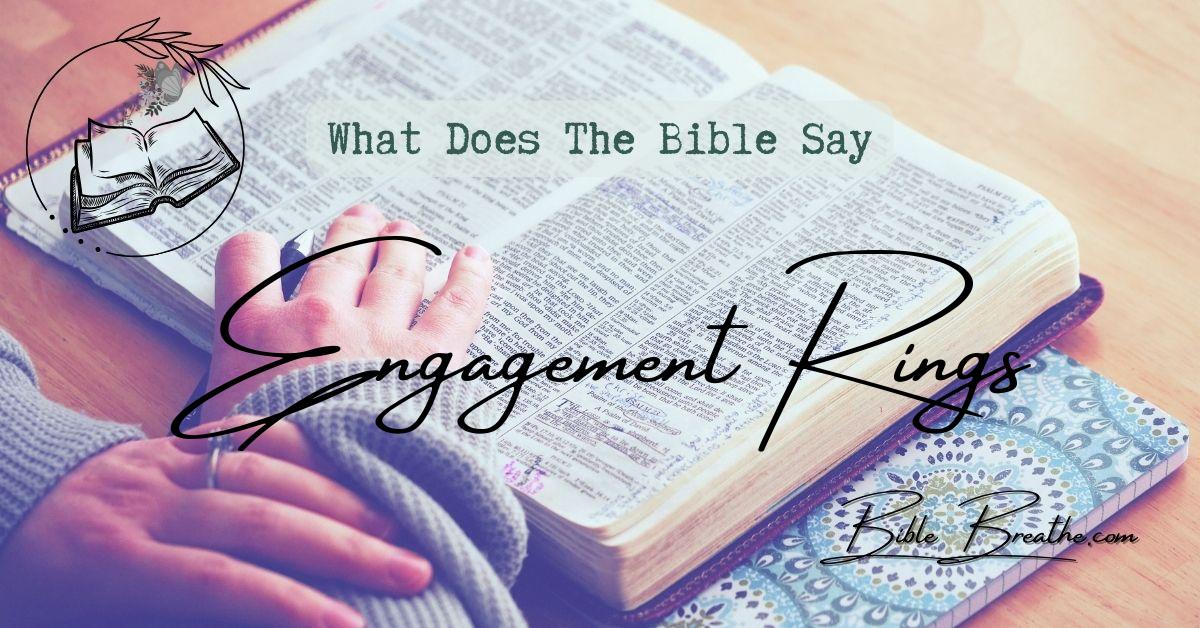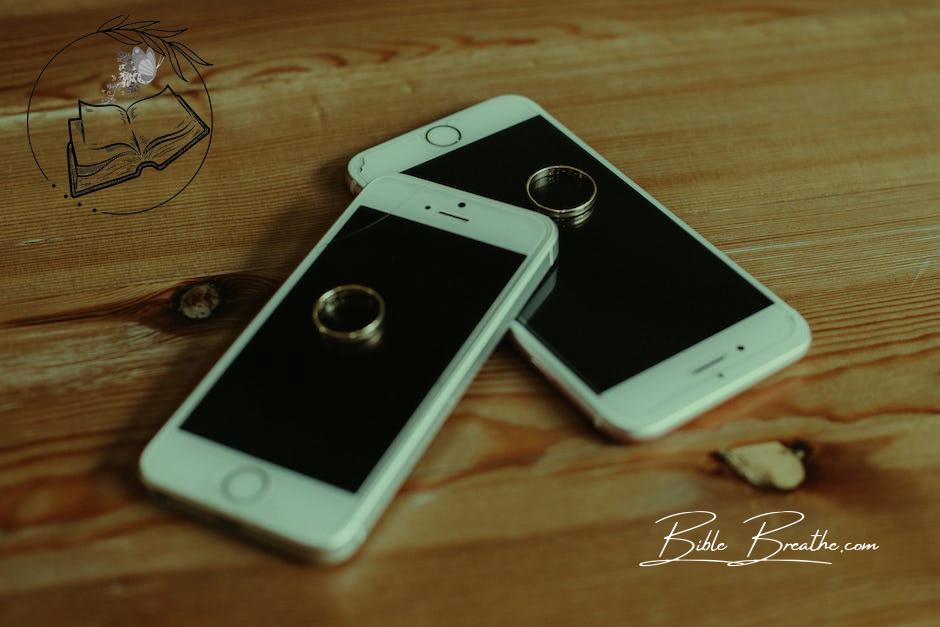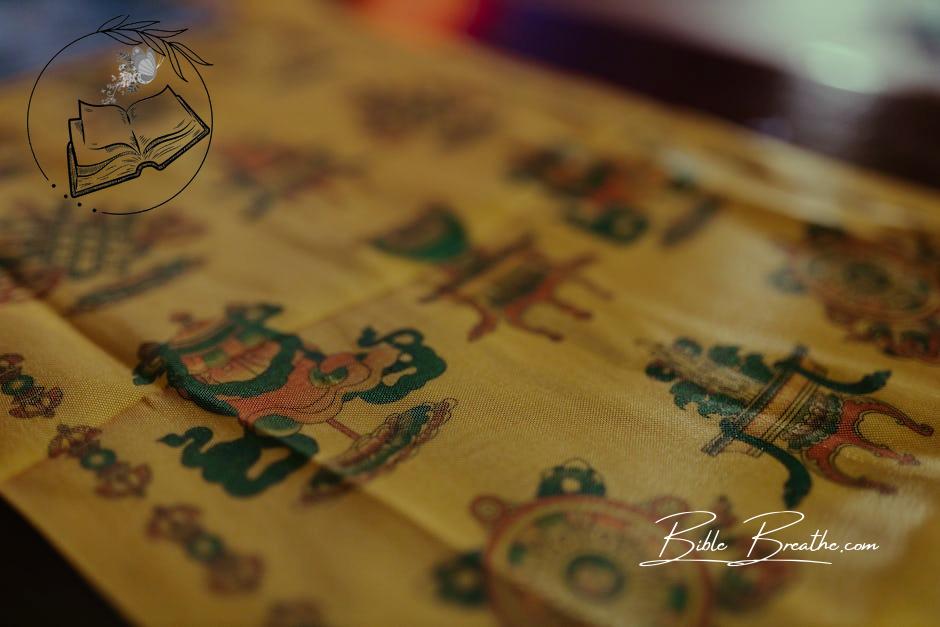What’s the deal with engagement rings in the good book?
Now, that’s a question that’ll put some bling in your step.
So, you’re about to pop the big question, and you’ve got that shiny ring box ready to roll.
But hold on, young lovers, PASTOR MICHAEL TODD’s gonna give you the lowdown on whether the Bible’s got anything to say about this cherished tradition.
In our world today, engagement rings are like love‘s business card, right?
They symbolize commitment, they’re all about that “forever” kinda love.
But does the Bible give us any hints about these sparkling circles?
Let’s break it down.
We’re gonna dive into the Biblical jewelry scene, check out what scripture says about marriage, and see if there’s any juice on covenant symbols.
But remember, the Bible might not be throwing “engagement ring” around like confetti, but it’s definitely got something to say about modesty, adornment, and, of course, those all-important marriage vows.
We’re on a journey, my friends, to understand what our faith has to say about the bling that binds hearts.
So, saddle up, and let’s ride this trail of love through the Bible’s pages and uncover the treasure within.
It’s gonna be a revelation!
💍📖🌟
Key Takeaways
- While the Bible does not specifically mention engagement rings, it provides guidance on modesty and humility in adornment, suggesting a thoughtful approach to expressions of love and commitment.
- Adornment, including symbols like engagement rings, should be embraced with modesty and humility, reflecting a heart-focused commitment rather than a focus on material possessions.
- The essence of commitment, as emphasized in the Bible, lies in the sincerity and dedication of the heart, transcending the need for external symbols or displays of affection.
- Exploring what the Bible says about engagement rings encourages individuals to prioritize the genuine and profound commitment in a relationship, valuing the significance of inner intentions and actions over external tokens.
- Ultimately, the Bible encourages a perspective that values love, faithfulness, and commitment as the true foundations of a relationship, embodying these values in one’s actions and attitudes rather than relying solely on material symbols.
Rings: Symbols of Promise and Restoration
Photo modified by BibleBreathe.com. Original photo by Juan Pablo Serrano Arenas on Pexels
You ever put on a ring and feel a weight of meaning beyond its metal and design?
Rings in biblical times were like that, more than just fancy finger gear.
Let’s take a stroll through history to understand what those rings meant back in the day.
Rings in the Days of Old
In the times of the Bible, a ring wasn’t just bling—it was a symbol, a promise, a mark of authority.
Picture this: crafted with care from gold or silver, these rings were more than adornments; they were an emblem of something deeper.
They sealed covenants and marked significant moments.
Imagine soft clay or wax meeting a ring.
The ring pressed its unique mark—a seal of authenticity and power.
It’s like God’s fingerprint on creation, a stamp of authority.
Rings: A Tale in Scriptures
Flip through the pages of the Bible, and you’ll find some mentions of rings that can teach us a thing or two:
-
Genesis 24:22 (KJV): Now here’s a story starter. Abraham‘s servant hands a ring to Rebekah—a promise, a sign of something beautiful on the horizon. It’s a bit like giving a ring before “putting a ring on it” in today’s terms.
-
Luke 15:22 (KJV): Ever heard the tale of the prodigal son? When he returns, his father throws a big celebration. And guess what? A ring takes the spotlight. It’s a symbol of restoration, of being back in the family fold.
These stories paint a picture: rings weren’t just for looks back then.
They carried stories of commitment, family ties, and renewed beginnings.
So, when we talk about engagement rings, it’s like a remix of an ancient melody.
They’re a modern echo of a tradition rooted deep in history—a promise, a covenant, a symbol of love.
In the next round, we’ll keep digging into this, discovering how this tradition still sings in our lives today.
Sparkling Wisdom: Unveiling God’s View on Adornment
Photo modified by BibleBreathe.com. Original photo by David Gomes on Pexels
Ever wondered what divine wisdom has to say about those glittering engagement rings?
Let’s take a journey through the scriptures, peeling back layers to understand the deeper meaning of adornment and jewelry.
1 Timothy 2:9 – Dressing with a Heart of Modesty
“Ladies, let’s chat attire. How ’bout rockin’ that modest look, with humility and grace, instead of getting tangled in fancy hairstyles, gold bling, or a high-end wardrobe?” – 1 Timothy 2:9 (KJV)
This scripture is a nudge towards modesty and simplicity in how we present ourselves.
It’s not about flaunting wealth or showcasing bling, but about letting our inner beauty shine brighter than any external dazzle.
1 Peter 3:3 – True Adornment from Within
“Now, it’s not saying skip the hairdo or leave the jewelry behind. It’s saying, don’t let the outer shine be all there is. The real treasure is in a gentle, quiet spirit, an unbeatable charm in God’s eyes.” – 1 Peter 3:3 (KJV)
Peter’s words remind us that while a good hair day and some bling can be a nice touch, true beauty is in the character within.
That gentle and peaceful spirit?
That’s what truly dazzles in the eyes of the Divine.
Proverbs 31:10 – A Woman’s Worth Beyond Rubies
“Now, let me tell ya, a virtuous woman? She’s worth more than the fanciest gem out there. Her value is priceless, and it’s not about the carats or the cut, but the heart that shines.” – Proverbs 31:10 (KJV)
This Proverbs verse drives home the point: a virtuous woman, her worth is beyond any bling money can buy.
It’s about the heart, the character, the essence that outshines any gem on this Earth.
The Bible doesn’t have a chapter dedicated to engagement rings, but through these verses, it echoes a timeless truth.
It’s not about how shiny our jewelry is, but how brightly our hearts reflect the love and character of our Creator.
In the next part, let’s dig into how these timeless truths can guide us in the world of engagement rings today.
Let’s see how we can make that sparkle meaningful in a world often focused on the superficial.
Rings: Symbolizing Power and Pledges
Photo modified by BibleBreathe.com. Original photo by RDNE Stock project on Pexels
Ever thought about what those rings meant in ancient times?
They were more than just shiny things—they carried weight, significance, and a story to tell.
Let’s dive into the Bible and see how rings played a role back in the day.
Rings: The Power Play (Genesis 41:42)
Pharaoh took off his ring from his hand, and put it upon Joseph‘s hand, and arrayed him in vestures of fine linen, and put a gold chain about his neck.” – Genesis 41:42 (KJV)
In Genesis 41:42, Pharaoh hands over his ring to Joseph.
It’s not just a ring—it’s a symbol of authority, a passing of the torch.
It screams responsibility and trust.
Back then, rings weren’t just flashy—they meant something, especially about power.
Rings: A Promise Sealed (Esther 8:8)
Write ye also for the Jews, as it liketh you, in the king’s name, and seal it with the king’s ring: for the writing which is written in the king’s name, and sealed with the king’s ring, may no man reverse.” – Esther 8:8 (KJV)
In Esther, a king’s ring was like a stamp of finality.
Once it bore that mark, it was a done deal.
Rings were the ancient version of “sealing the deal.”
It’s like saying, “This is unchangeable; this is our word.”
Looking back, rings were power symbols, commitment emblems, and the stamp on important decisions.
While the Bible doesn’t dive into diamond sparklers and proposals, it does show us that rings were more than just accessories.
They symbolized authority, commitment, and the irrevocable.
So, when we slip on an engagement ring today, remember—it’s more than a piece of jewelry.
It’s a symbol of trust, love, and a promise for a future together.
In our final chat, we’ll wrap this up and see how these ancient tales whisper wisdom into our modern lives.
Symbols of Promise: Unveiling Engagement Rings through a Biblical Lens
As we delve into the world of engagement rings and their potential biblical connection, it’s vital to uncover the layers of culture and tradition surrounding these cherished symbols while considering what the Bible shares about such customs.
The Heartfelt Symbolism of Engagement Rings
Engagement rings have become a universal symbol of love, commitment, and the desire for a lifelong partnership in today’s world.
These rings hold the essence of a couple’s pledge to each other, often sealed with a heartfelt proposal and the presentation of this precious ring.
With diverse styles and designs, engagement rings mirror personal preferences and cultural heritage.
They mark a period of betrothal, signifying the commitment to progress towards marriage.
Biblical Insights on Traditions and Pledges
The Bible offers insights into the significance of traditions and commitments within the lives of believers.
Although it doesn’t prescribe specific customs, it encourages a life lived with integrity, love, and faithfulness, emphasizing that traditions should align with principles of love, justice, and righteousness.
In 1 Corinthians 7:36-38, the Apostle Paul discusses betrothal and marriage customs.
He acknowledges the variability of customs but stresses the importance of honoring one’s commitments and vows.
“If any man thinks he is behaving improperly toward the virgin he is engaged to, and if she is getting along in years and he feels he ought to marry, he should do as he wants. He is not sinning. They should get married. But the man who has settled the matter in his own mind, who is under no compulsion but has control over his own will, and who has made up his mind not to marry the virgin—this man also does the right thing. So then, he who marries the virgin does right, but he who does not marry her does better.” – 1 Corinthians 7:36-38 (KJV)
This passage underscores the importance of making and honoring commitments in alignment with one’s cultural practices.
Harmonizing Tradition and Biblical Principles
While the Bible doesn’t explicitly mention engagement rings, they can align with biblical principles of commitment, love, and integrity.
They stand as tangible symbols of a couple’s intention to enter the sacred covenant of marriage, reflecting the biblical concept of faithfulness.
In summary, engagement rings bear a unique significance in contemporary society as symbols of love and commitment.
Although not explicitly discussed in the Bible, they can align with biblical principles of honesty and faithfulness within the context of cultural practices.
Ultimately, an engagement ring’s worth goes beyond its material value, embodying the sincerity and dedication within a loving relationship.
As individuals navigate the interplay of tradition, culture, and faith, it’s crucial to approach such customs with thoughtful consideration, ensuring they resonate with the values and principles close to their hearts and are in harmony with their beliefs.
The Sacred Bond of Marriage: A Biblical View
Photo modified by BibleBreathe.com. Original photo by viresh studio on Pexels
You ever wondered about marriage, what makes it tick according to the good book?
Let’s open those pages and see what ancient wisdom spills out.
Genesis 2:24 – When Two Become One
“A man leaves his kin and holds fast to his woman, and they become one flesh.” – Genesis 2:24 (KJV)
In Genesis 2:24, it’s like God whispers the recipe for marriage.
Picture it: two pieces of a puzzle, fitting perfectly, creating something beautiful together.
Leaving behind the old, embracing the new—that’s marriage.
Matthew 19:4-6 – The Sacred Knot
“Haven’t you read that the Creator made them male and female and said, ‘For this reason, a man will leave his father and mother and be united to his wife, and the two will become one flesh’? So, they are no longer two, but one flesh. Therefore, what God has joined together, let no one separate.” – Matthew 19:4-6 (KJV)
Now, in Matthew 19:4-6, Jesus gives us a reality check about marriage.
It’s not just a contract; it’s a divine knot.
God Himself brings two souls together, and no one should tear that apart.
It’s sacred ground.
Ephesians 5:22-33 – The Dance of Love
In Ephesians, Paul paints a picture of marriage as a dance.
Imagine Christ and the church waltzing, and husbands and wives following their lead.
This dance is all about love, respect, and unity, mirroring the love Christ showers on His church.
So, when we talk about engagement rings, they’re like the prelude to this grand dance.
They aren’t in the ancient scrolls, but they speak of commitment, of stepping onto that sacred dance floor.
They’re a sign of what’s to come, a visible promise of that beautiful union.
In a nutshell, the Bible portrays marriage as a sacred merger.
Engagement rings, though not written in ancient ink, can symbolize that commitment, that unity—like a trailer before the main movie.
But remember, the true magic lies in the hearts that wear those rings, in the love that binds and the God who smiles upon this sacred journey.
And with that, we wrap up this little chat about love, rings, and the sacred book.
Frequently Asked Questions (FAQs) About What Does The Bible Say About Engagement Rings
Does the Bible explicitly mention engagement rings?
The Bible doesn’t mention engagement rings as we know them today.
Engagement customs have varied across cultures and times.
However, the Bible emphasizes the sanctity of marriage and the commitment between partners.
The use of engagement rings is a cultural tradition, not a biblical requirement.
What does the Bible say about wearing jewelry?
The Bible addresses jewelry in various ways, but it doesn’t outright forbid wearing it.
It encourages modesty and highlights the importance of inner beauty.
For example, 1 Peter 3:3-4 advises focusing on the ‘hidden person of the heart’ over external adornments.
How should believers approach the tradition of engagement rings?
The use of engagement rings is cultural and lacks specific biblical mandates.
Believers can approach this tradition with personal conviction, considering the ring as a symbol of commitment and love, adhering to biblical principles of honesty, faithfulness, and respecting one another in the relationship.





